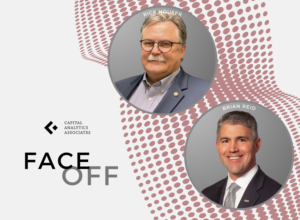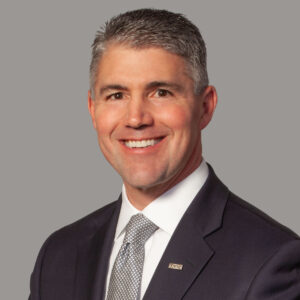Writer: Eleana Teran
 2 min read September 2023 — In the Triangle region, where growth and community are intertwined, banks are playing a vital role in shaping the future. According to the FDIC, banks earned $70.8 billion in the second quarter of 2023, indicating a strong financial performance that underscores the active roles banks have in fostering regional growth.
2 min read September 2023 — In the Triangle region, where growth and community are intertwined, banks are playing a vital role in shaping the future. According to the FDIC, banks earned $70.8 billion in the second quarter of 2023, indicating a strong financial performance that underscores the active roles banks have in fostering regional growth.
Similarly, a recent report by the FRB emphasized the importance of assessing vulnerabilities in the financial sector, highlighting the significance of resilient and stable financial institutions in maintaining economic vitality.
Invest: spoke with Rick Houser, senior vice president of Benchmark Community Bank, and Brian Reid, president of Triangle region for TowneBank, to learn more about how their institutions are fostering economic vitality and enriching the community.
Houser shared Benchmark Community Bank’s practical and impactful approach, emphasizing the importance of effective communication and genuine customer service, which have been foundational to their historic loan growth. Reid, highlighting North Carolina’s thriving environment, spoke about TowneBank’s substantial investments in nonprofits and educational institutions, positioning the bank as a community asset, especially for the underserved.
What are the bank’s contributions to the Triangle region?
Rick Houser, Senior Vice President, Benchmark Community Bank: “The model we have here is that of our model in Southside Virginia. It is a common sense approach to banking. We work hard to make things happen and try to execute. People talk about customer service as a cliche but it comes down to how you follow through and communicate with your customer. We have been able to deliver that to our customers in North Carolina every day. We believe taking care of our employees means employees will take care of our customers.
We had a loan growth year in 2022 that was by far higher than anytime in our bank’s history and 75% to 85% of our growth has come from our work in North Carolina. Last year, our Raleigh market grew 52%. Our staff turns loans around very quickly, which has been a hallmark of our brand here.”
 Brian Reid, President – Triangle Region, TowneBank: “We are blessed in North Carolina to be in a state where people want to continue coming to, which makes us a growth market. For that reason, we have a very healthy banking environment. In terms of serving the community, TowneBank has invested in various nonprofits and works with a variety of charities. As an example, we provided NC State University with a $5 million gift that resulted in TowneBank Center. We are also blessed to serve over 450 nonprofits in the Triangle and through those partnerships, we help them with their mission. Beyond being a bank, we are a community asset and often help those who are underserved.”
Brian Reid, President – Triangle Region, TowneBank: “We are blessed in North Carolina to be in a state where people want to continue coming to, which makes us a growth market. For that reason, we have a very healthy banking environment. In terms of serving the community, TowneBank has invested in various nonprofits and works with a variety of charities. As an example, we provided NC State University with a $5 million gift that resulted in TowneBank Center. We are also blessed to serve over 450 nonprofits in the Triangle and through those partnerships, we help them with their mission. Beyond being a bank, we are a community asset and often help those who are underserved.”
What are some of the key challenges the banking industry is currently facing?
Houser: “We have seen a lot of challenges in the market. The pandemic recovery has seen rising inflation, lack of workers and supply chain issues. It has challenged the small businesses we deal with on a daily basis and for the builder group especially. They have seen heightened prices and shortages in all types of materials. When prices were initially going up, our builders had pre-sold homes. Many times, prior to the home being completed there profit margin has been squeezed. We felt the need to protect these local builders , as they are so important to the growth in our communities . As a result, we capped our interest rates for our builders to give them a financial break. We have been more flexible on a case-by-case basis to meet our customers’ needs and protect them.”
Reid: “All banks in these past 15 months have been in an interesting landscape. We went from 0% interest rates to a complete 180-degree turn in a short period of time. As a result, banks need to be more judicial about the capital or loans they are putting on the streets. There were a few incidents with banks earlier this year but that doesn’t mean a crisis as it was really about select banks making poor decisions.
In light of that, it is important for banks to maintain strong liquidity, strong capital and a strong loan portfolio. We are here to make sure the folks who have chosen us to take care of their banking needs are having those needs fully met. We are not looking to make quick deals because we are more about relationships.”
How are regulatory changes affecting banking today?
Houser: “When we make a loan to a consumer to buy a home, we have to put in a multitude of fields of information. Now, the government has expanded this to small businesses, with 25 to 40 fields of information about them. The banks don’t like this, especially small banks like us. I don’t think it should apply to us. It will be a burden on the banks and customers and it’s an invasion of privacy. The regulatory burden is very tough on banks. It costs a lot of money to keep up with and causes small banks to close because they can’t pay.
Locally in North Carolina, we saw legislation recently to allow credit unions to expand to do more commercial-type lending and open up their membership options to anyone who owns their own business. The difficulty the North Carolina Bankers Association has with that legislation is that credit unions are not taxed. It is not a level playing field for small community banks.”
How are interest rate changes impacting the real estate market?
Reid: “Big projects that involve cranes and such have a lot of math behind them but, unfortunately, as the prices of land, labor and materials have gone up on top of higher interest rates, the math isn’t working. For that reason, projects are being put on hold, which slows things down in terms of development.”
For more information visit:

